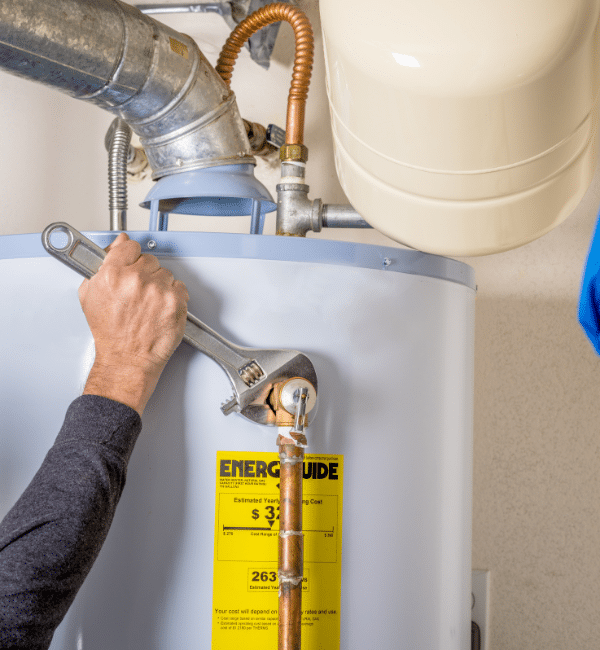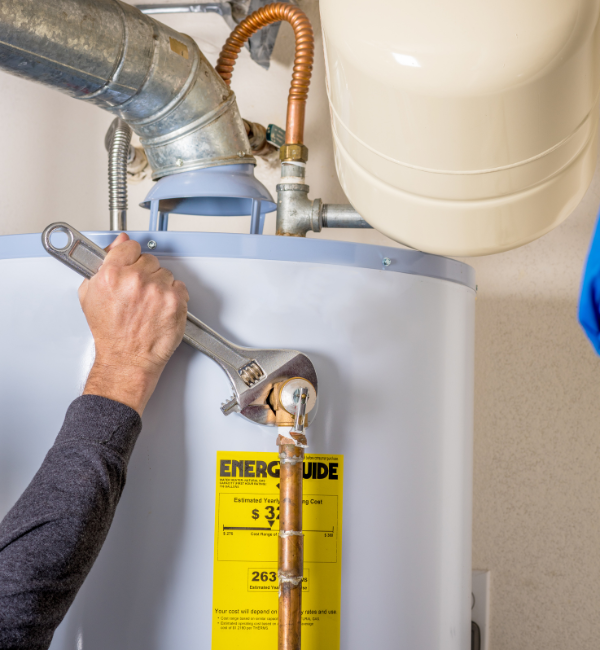Introduction
When faced with a malfunctioning water heater, homeowners often find themselves in a dilemma: should they repair the existing unit or opt for a replacement? This decision is crucial as it can have long-term consequences on cost, efficiency, and longevity.
Understanding the factors that weigh into this choice is of utmost importance. Repairing a water heater can be a cost-effective option if the issue is minor and the unit is relatively new. However, if the problem is significant, recurring, or the water heater is approaching the end of its lifespan, a replacement may prove to be more beneficial in the long run. Efficiency is another critical aspect to consider. Older water heaters may have lower energy efficiency ratings, resulting in higher utility bills. By upgrading to a newer unit, homeowners can potentially save money by benefiting from improved insulation, better thermostats, and advanced technology. Lastly, the lifespan of a water heater is crucial. Most standard units last between 8 to 12 years, but factors such as maintenance, water quality, and usage patterns can impact this timeframe. If a water heater is consistently requiring repairs or nearing the end of its expected lifespan, investing in a replacement may prove to be a more practical choice.
By taking into account these factors – cost, efficiency, and longevity – homeowners can make an informed decision whether to repair or replace their malfunctioning water heater.
Understanding Your Water Heater
Water heaters are essential appliances in most homes, providing a steady supply of hot water for various purposes. Understanding the different types of water heaters commonly used can help homeowners make informed decisions about whether to repair or replace their unit.
The most common types of water heaters are tank, tankless, solar, and hybrid. Tank water heaters store and heat a large amount of water in a insulated tank, ready for use whenever needed. Tankless water heaters, on the other hand, heat water on-demand as it flows through the unit, eliminating the need for a storage tank. Solar water heaters use the power of the sun to heat water, making them an eco-friendly and cost-effective option. Hybrid water heaters combine the benefits of both tank and tankless systems, utilizing a tank for storage and a heat pump for efficient water heating. The type of water heater you have can greatly influence the decision to repair or replace. Tank water heaters generally have a lifespan of 8 to 12 years, while tankless units can last up to 20 years. Solar and hybrid water heaters can also have long lifespans. If your water heater is nearing the end of its expected lifespan, it may be more cost-effective to replace it rather than spending money on frequent repairs. Additionally, the cost and availability of parts for different types of water heaters can also impact the decision-making process.
Overall, understanding the type of water heater you have, its expected lifespan, and the cost-effectiveness of repair versus replacement can help you make an informed decision that meets your needs and budget.
Signs Your Water Heater Needs Attention
Water heaters are an essential component of any home, providing hot water for daily activities such as bathing and cooking. However, over time, these appliances can develop issues that require attention. Here are some common signs to look out for that indicate your water heater needs repair or replacement.
Inconsistent water temperature is often a telltale sign of a problem. If you notice that the water suddenly turns cold after a few minutes, it could indicate a faulty thermostat or a sediment buildup inside the tank. Noise coming from your water heater, such as popping or rumbling sounds, may indicate the presence of mineral buildup or a sediment layer. Leaks are another critical sign that your water heater needs attention, as they can lead to significant water damage if left unaddressed. Discolored water, especially if it appears rusty or has a metallic taste, suggests corrosion inside the tank. These symptoms occur due to various reasons. Sediment buildup is one of the most common culprits, reducing the efficiency of the water heater and leading to a range of issues. Mineral deposits can also cause heat transfer problems and premature failure. Additionally, leaks may result from a cracked or corroded tank, while discolored water signifies rusting or increased metal corrosion.
Understanding these signs and their underlying causes is crucial in determining whether your water heater requires a simple repair or a complete replacement. It is often wise to consult a professional plumber who can assess the situation accurately and provide appropriate advice tailored to your specific needs.
When to Consider Repairing Your Water Heater
Repairing a water heater can often be a cost-effective solution to specific issues that arise. There are several scenarios where repair is usually sufficient and can extend the life of your unit.
Faulty thermostats are a common problem in water heaters and can often be repaired rather than replaced. The cost of replacing a thermostat typically ranges from $100 to $200, depending on the model and type of water heater. With a repaired thermostat, you can expect an extension of the unit’s life for several more years.
Minor leaks are another circumstance where repair is often the best option. Leaks can occur due to loose connections or worn-out valves, which can usually be fixed without replacing the entire water heater. The cost of repairing a minor leak can range from $150 to $300, depending on the complexity of the issue. When repaired promptly, the unit can continue functioning effectively for an extended period.
Sediment buildup is a common issue in water heaters, especially in areas with hard water. Through flushing and cleaning, sediment buildup can often be resolved without requiring a complete replacement. The cost of sediment removal can vary depending on the severity of the buildup but typically falls within the range of $100 to $300. By addressing sediment buildup, you can enhance the longevity of your water heater.
In summary, scenarios such as faulty thermostats, minor leaks, and sediment buildup often present opportunities for repair rather than replacement. By addressing these issues promptly, homeowners can save costs and significantly extend the life of their water heaters.
When Replacement Makes More Sense
There are certain scenarios where replacing your water heater is a more sensible choice than repairing it. These situations typically arise when the water heater is beyond its expected lifespan, repairs are frequently needed, or when there is a major failure like a tank rupture.
Water heaters generally have a lifespan of around 10 to 15 years. If your water heater is approaching or surpassing this age, it may be more cost-effective to replace it rather than spend money on continuous repairs. Older units are also likely to be less energy-efficient, resulting in higher utility bills. By upgrading to a newer model, you can take advantage of advancements in technology that offer improved energy efficiency and lower operating costs. Frequent repairs are another red flag that indicates replacement may be the better option. Continually fixing small issues can add up in terms of cost and inconvenience. Additionally, older water heaters tend to experience more problems as they age, which can result in frequent breakdowns. In such cases, it is often more practical to invest in a new water heater that will provide reliable performance for years to come. One of the most severe issues that may warrant replacement is a tank rupture. This can lead to significant water damage to your home and pose safety hazards. In scenarios like these, it is crucial to replace the water heater as quickly as possible to avoid further damage and ensure the safety of your household.
Replacing a water heater makes more sense when it is beyond its expected lifespan, repairs are frequent, or there is a major failure like a tank rupture. By choosing to upgrade, homeowners can take advantage of improved energy efficiency, lower operating costs, enhanced reliability, and peace of mind.
Choosing a New Water Heater
When it comes to choosing a new water heater, there are several factors to consider to ensure you find the right fit for your household needs.
1. Size: The size of the water heater will depend on the number of people in your household and your hot water usage. A professional can help you calculate the appropriate size based on your specific requirements.
2. Energy Efficiency Ratings: Consider looking for water heaters with high energy efficiency ratings such as the ENERGY STAR label. These models are designed to consume less energy, resulting in lower utility bills and reduced environmental impact.
3. Fuel Type: Water heaters can be powered by various fuels, including electricity, natural gas, propane, and solar energy. Take into account the availability and cost of different fuel types in your area, as well as any environmental considerations.
4. Consulting with a Professional: It is highly recommended to consult with a professional plumber or contractor to determine the best water heater for your home. They can assess your current setup, evaluate your hot water needs, and recommend the most suitable options.
By carefully considering these factors and seeking expert advice, you can confidently choose a new water heater that will meet your household’s hot water demands efficiently and effectively.
Maintenance Tips to Extend Water Heater Life
Regular maintenance practices can significantly extend the lifespan of a water heater, regardless of its age. Here are some tips to help homeowners keep their water heaters running efficiently for as long as possible.
1. Flushing the tank: Sediment buildup can cause a water heater to become less efficient over time. It is recommended to flush the tank every six to twelve months. To do this, turn off the power supply and connect a garden hose to the drain valve. Open the valve and let the water flow out until it runs clear.
2. Checking the anode rod: The anode rod is a sacrificial component that helps prevent corrosion inside the tank. Inspect the rod every two to three years and replace it if it is heavily corroded. The rod should be inspected more frequently if the water has a high mineral content.
3. Inspecting for leaks and corrosion: Regularly inspect the water heater for leaks and signs of corrosion. Check the pressure relief valve, pipe fittings, and connections. A small leak or corrosion can quickly escalate into a major problem, so early detection is crucial.
By performing these routine maintenance tasks and adhering to a schedule, homeowners can maximize the lifespan of their water heater and save money on repairs or replacements. Remember to always follow the manufacturer’s guidelines for specific maintenance instructions.
Conclusion
The decision to repair or replace your water heater depends on various factors. Throughout this guide, we have highlighted key considerations such as the age of the water heater, the extent of the damage, the cost of repairs, and the energy efficiency of newer models.
Before making a decision, it is crucial to evaluate your current situation carefully. If your water heater is relatively new and the repairs are minor, it may be more cost-effective to opt for repairs. However, if your water heater is old and the repairs are extensive or if you are experiencing frequent breakdowns, it might be more prudent to invest in a new unit. Consider the long-term benefits as well. Newer models are often more energy-efficient, which can result in lower utility bills over time. Additionally, they may come with better warranties and improved safety features. It is always a good idea to consult with a professional plumber or water heater specialist to assess your specific situation and provide expert advice. They can help you determine the best course of action based on your needs, preferences, and budget.
Remember, making an informed decision now can save you time, money, and stress in the long run.






